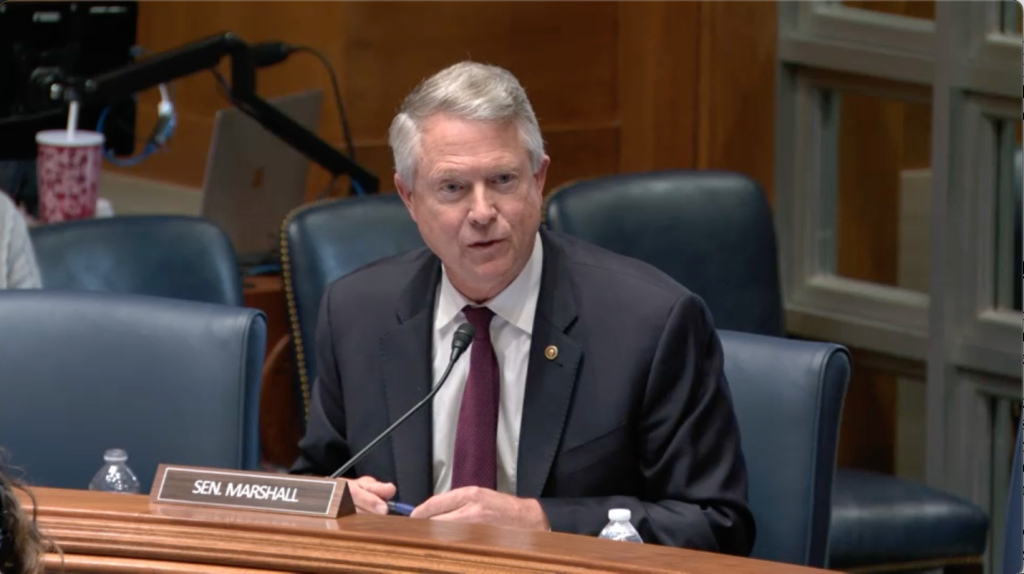Senator Marshall: Throwing More Federal Spending at Tuition Doesn’t Make It More Affordable
Senator Marshall Questions Witnesses at Senate HELP Committee Hearing
Washington – On Thursday, U.S. Senator Roger Marshall, M.D. (R-Kansas), questioned witnesses including Director of Financial Aid at Southwestern College, Brenda Hicks, MA, Senior Vice President for Affordability at Strada Education Foundation, Justin Draeger, MBA, Senior Fellow at American Enterprise Institute, Preston Cooper, Ph.D., Chief Executive Officer of Detroit Promise, Onjila Odeneal, M.Ed., and Director of Policy and Advocacy at the Hope Center for Student Basic Needs, Mark Huelsman, M.Ed., at the Senate Health Education Labor and Pensions Committee hearing focused on reforming financial transparency in higher education.

Click HERE or on the image above to watch Senator Marshall’s full remarks.
Highlights from the hearing include:
Senator Marshall: “Chairman and Ranking Member. Thanks for holding this hearing. And I’m always amazed how often in this committee we agree on the same goals. We all agree that there are affordability issues today. There are results of four years of inflation from 2021 until the start of this year. And of course, inflation is cumulative. We saw that nowhere more than in housing, in health care, transportation, and food costs, often those going up 20 to 25% and education costs are going up as well. I guess sometimes where we differ on the solution is just throwing more money at it, that there’s more federal spending on tuition is just going to drive that inflation up, and that doesn’t really make it more affordable. It’s just shifting the cost from students and shifting it to the federal government. And like one of our witnesses, I was a first-generation college student. I was that student who had the choices between going to the university, but I chose to go to a community college. It was a varsity athlete, working three jobs, just like you described in medical school. I had the choice between borrowing money or joining the Army, so I joined the Army as well the Army Reserve and specifically. So there’s other choices out there, other than just getting more money from the federal government. And by the way, no one said this should be easy. No one said it should be easy. I’m so grateful for those experiences, those part-time jobs I had to take. I learned so much at those. From working at a sale barn to working in the toy department of Walmart and as a bartender, those were all great experiences that helped me to become a better doctor. Mrs. Hicks, we’ll start with you. The College Transparency Act – I hope you’ve had a chance to look at a little bit. Any thoughts on the pros and cons of this College Transparency Act?”
Mrs. Hicks: “No, I did take a look at it, and it is very good. Yeah, I think that a couple of things I see that I appreciate and like how the protections are in place with privacy for the student at the student level. I also think and see that a student-level data field would help ease some of the administrative burden that we have. I think if anything, any policy that helps me spend more time on an interaction with a student is a good policy and takes me away from doing more of the reporting.”
Senator Marshall: “Let’s talk about the FAFSA Act, Simplification Act. When this latest passive issue or report came out, you actually attended one of the round tables I sat down with to listen to everyone’s concerns about it, and I haven’t heard as much lately about it. Did we get the problem solved? And how did it get solved?”
Mrs. Hicks: “I think that the department worked really hard to do testing this time around, and it is delightful to fill out. It takes less than 10 minutes per contributor. I would usually go out to the local high schools and help them do financial aid nights and help people fill out the FAFSA. We used to spend hours at those helping people. We spent, I think, the last one at my local high school. We were there for 30 minutes and everybody was done. It was great. Great.
Senator Marshall: “What are some actions we could take to ensure it is clear to students what kind of aid they are receiving. Is the way different schools provide this information to students uniform across schools?”
Mrs. Hicks: “So I think improvements could be made there. But again, I think that, as I said in my testimony, I think requiring standard definitions and terms, requiring those elements is important, but then I think flexibility is important also, so that schools can describe those elements and present those elements in ways that make sense for their populations.”
###
Contact: Payton Fuller
